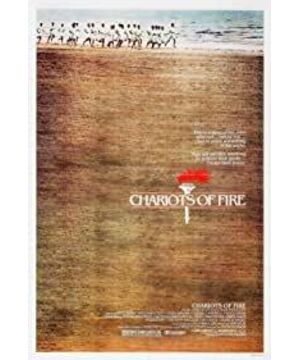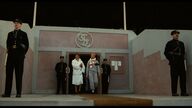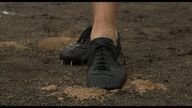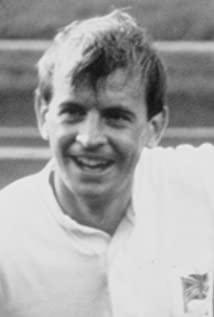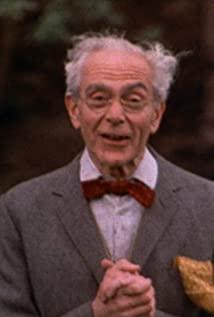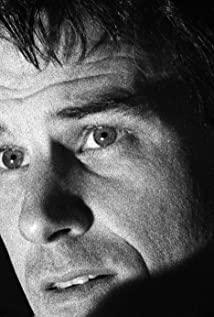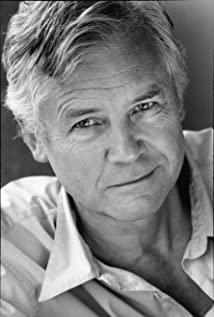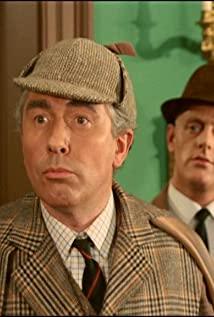The movie is based on the true story of two British athletes competing in the 1924 Summer Olympics in Paris. Englishman Harold Abrahams (Ben Cross), who is Jewish, overcomes anti-Semitism and class prejudice in order to compete against the "Flying Scotsman" , Eric Liddell (Ian Charleson), in the 100 metre race. Opening in 1919 England, Harold Abrahams enters Cambridge University, where he meets with anti-Semitism from the staff, but enjoys participating in the Gilbert and Sullivan theatre club. He becomes the first person to ever complete the Trinity Great Court run: running around the court in the time it takes for the clock to strike 12. Abrahams achieves an undefeated string of victories in various national running competitions. Although focused on his running, he falls in love with a famous Gilbert and Sullivan soprano,Sybil (Alice Krige). Meanwhile in Scotland, Eric Liddell (Ian Charleson), born in China of Scottish missionary parents, is in Scotland. His devout sister Jennie (Cheryl Campbell) disapproves of Liddell's plans to pursue competitive running. But Liddell sees running as a way of glorifying God before returning to China to work as a missionary. Abrahams and Liddell meet for the first time in London in June 1923 when they first race against each other in a British open. Liddell beats Abrahams who takes it extremely badly. But Sam Mussabini (Ian Holm), a professional trainer whom Abrahams had approached earlier, offers to take him on to improve his technique. This attracts criticism from the Cambridge college masters (John Gielgud and Lindsay Anderson). In their meeting with Abrahams,the Cambridge masters allege it is ungentlemanly for an amateur to "play the tradesman" by employing a professional coach. Abrahams realizes this is a cover for their anti-Semitism and class entitlement, and dismisses their concern. Meanwhile, when Liddell accidentally misses a church prayer meeting because of his running, his sister Jennie upbraids him and accuses him of no longer caring about God. But Eric tells her that though he intends to eventually return to the China mission, he feels divinely inspired when running, and that not to run would be to dishonor God: "I believe that God made me for a purpose. But He also made me fast, and when I run, I feel His pleasure." The two athletes, after over a year of training and racing, are accepted to represent Great Britain in the 1924 Summer Olympics in Paris, France.Also accepted are Abrahams' Cambridge buddies, Lord Andrew Lindsay (Nigel Havers), Aubrey Montague (Nicholas Farrell), and Henry Stallard (Daniel Gerroll) whom join the UK team. While boarding the boat to Paris for the Olympics, Liddell learns from the newspapers that the event for his 100 meter race will be on a Sunday. Liddell refuses to run the race despite strong pressure from the Prince of Wales (David Yelland) as well as the head of the British Olympic committee, Lord Cadogan (Patrick Magee) because Liddell's Christian convictions prevent him from running on the Christian Sabbath (Sunday). Hope appears in the form of Liddell's teammate Lord Andrew Lindsay. Having already won a silver medal in the 400 meter hurdles, Lindsay proposes to yield his place in the 400 meter race on the following Tuesday to Liddell.Liddell gratefully agrees. His religious convictions in the face of national athletic pride make headlines around the world. Liddell delivers a sermon at the Paris Church of Scotland that Sunday, and quotes from Isaiah 40, verse 31: "But they that wait upon the LORD shall renew their strength; they shall mount up with wings as eagles; they shall run, and be not weary; and they shall walk, and not faint." Meanwhile, Abrahams is badly beaten by the heavily favored and more experienced United States runner Charles Paddock (Dennis Christopher) in the 200 meter race who wins the gold medal, while Abrahams takes a second place silver medal. Abrahams knows that his last chance for a gold medal will be the 100 meter run. He competes in the 100 meter sprint and wins, beating Paddock and the rest of the Americans. On Tuesday,just before Liddell's race, the American coach remarks to his runners that Liddell has little chance of doing well in his now far longer 400 meter race. But one of the American runners, Jackson Scholz (Brad Davis), hands Liddell a note of support for his convictions. Liddell defeats all the American favorites and wins the gold medal. The British team returns home triumphant. Abrahams and Liddell then part ways, with Abrahams returning to Sybil and Liddell goes off to return to China with his missionary family. As the film ends, an onscreen text explains that Abrahams married Sybil, and became the elder statesman of British athletics. He died in January 1978. The elulogy at Abrahams' funeral is delivered by the elderly Lord Andrew Lindsay, the last surviving member of the 1924 UK Olympic Team.Eric Liddell went on to his missionary work back in China where he later died in a prison camp at the hands of Japanese troops in 1945.
View more about Chariots of Fire reviews


